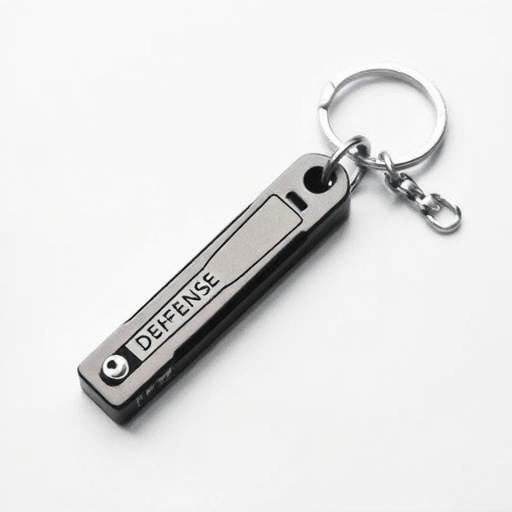Carrying a legal self-defense keychain accessory in the US requires understanding varied state laws, which significantly impact permitted defense tools by location. Regulations cover weapon type (e.g., pepper spray, tasers, knuckles), size, and force allowed, with some states having more relaxed rules than others. Staying informed about these local nuances is vital for compliance and personal safety when using such accessories. Always purchase from reputable manufacturers and responsibly use as a last resort after exploring peaceful conflict resolution methods.
In today’s world, personal safety is paramount. One popular self-defense tool gaining traction is the legal self-defense keychain accessory. This compact device offers peace of mind in a tiny package. However, navigating the legal landscape surrounding these tools varies state by state. Understanding your rights and adhering to regulations is crucial when considering a keychain weapon for self-defense. This guide breaks down the key legal considerations, state-specific laws, and safety practices for those interested in carrying a legal self-defense keychain accessory.
- Understanding Self-Defense Rights and Regulations
- Legal Considerations for Carrying a Keychain Weapon
- State-Specific Laws and Their Impact
- Ensuring Safety and Compliance While Using Keychain Self-Defense Accessories
Understanding Self-Defense Rights and Regulations
In many states, individuals have a right to protect themselves and their property, and this often includes the use of self-defense tools like keychains. However, understanding the legal requirements for carrying such devices is crucial before investing in a legal self-defense keychain accessory. The term “legal” here refers to compliance with state laws, which can vary significantly from one region to another. Some states have more relaxed regulations, allowing a wider range of self-defense tools, while others have stringent rules regarding the type, size, and capacity of such devices.
Knowing what constitutes legal self-defense keychain accessories involves understanding specific laws related to carrying and using these tools. This includes restrictions on blade length, ban on certain types of weapons (like tasers or stun guns), and permits required for concealed carry. Staying informed about these regulations is essential to avoid legal repercussions.
Legal Considerations for Carrying a Keychain Weapon
Carrying a keychain weapon for self-defense raises several legal considerations that vary significantly across states. In many jurisdictions, small, concealed weapons like keychains are regulated under specific laws tailored to permit or restrict their use. These regulations often dictate where and how such devices can be carried, who is eligible to possess them, and the potential consequences of breaking these rules.
Understanding local legislation is crucial for individuals considering legal self-defense keychain accessories. Some states may require permits or licenses for open or concealed carry, while others have specific exemptions for tools like keychains. Additionally, there might be restrictions on the type of weapon allowed, its size, and the amount of force it can exert. Being informed about these legal nuances ensures compliance and enhances personal safety.
State-Specific Laws and Their Impact
In the realm of legal self-defense keychain accessories, state-specific laws play a crucial role in dictating what constitutes permissible defense tools. Each US state has its own set of regulations regarding personal protection devices, particularly when attached to keys. These laws can vary widely, affecting the type, size, and even the materials used in the design of legal self-defense keychains. For instance, some states permit only certain types of non-lethal force, such as pepper spray or tasers, while others allow a broader range of tools like knuckles, batons, or even stun guns.
Understanding these state-by-state variations is essential for individuals looking to carry legal self-defense keychain accessories. What might be permitted in one state could be strictly regulated or outright banned in another. Therefore, residents must familiarize themselves with their local laws to ensure they remain within the legal boundaries. This knowledge empowers them to choose appropriate self-defense tools that align with their state’s regulations, fostering a sense of security while adhering to the law.
Ensuring Safety and Compliance While Using Keychain Self-Defense Accessories
When carrying a keychain self-defense accessory, ensuring safety and compliance with local laws is paramount. These small yet potent tools are designed to provide individuals with an extra layer of protection in various situations, but their use comes with responsibilities. It’s crucial to familiarize yourself with your state’s or region’s legal requirements regarding legal self-defense keychain accessories. Each jurisdiction has its own set of rules and regulations governing the carriage and use of personal defense devices, including keychains. Understanding these laws is essential to avoid legal repercussions and ensure you’re using your accessory responsibly.
To stay on the right side of the law, only purchase keychain self-defense tools from reputable manufacturers who adhere to safety standards. Additionally, keep yourself informed about any restrictions or permits required for carrying such devices in public spaces. Remember, while these keychains offer a sense of security, their primary purpose is to be used only as a last resort when facing an imminent threat. Always explore peaceful conflict resolution methods first and use the accessory as a means of self-defense only if absolutely necessary.
When considering the legal aspects of self-defense keychain accessories, understanding your state’s specific regulations is paramount. These small yet powerful tools can provide a sense of security, but it’s crucial to ensure they comply with local laws. By staying informed about legal requirements and prioritizing safety, individuals can exercise their right to self-defense while navigating the complexities of state-specific regulations regarding legal self-defense keychain accessories.
